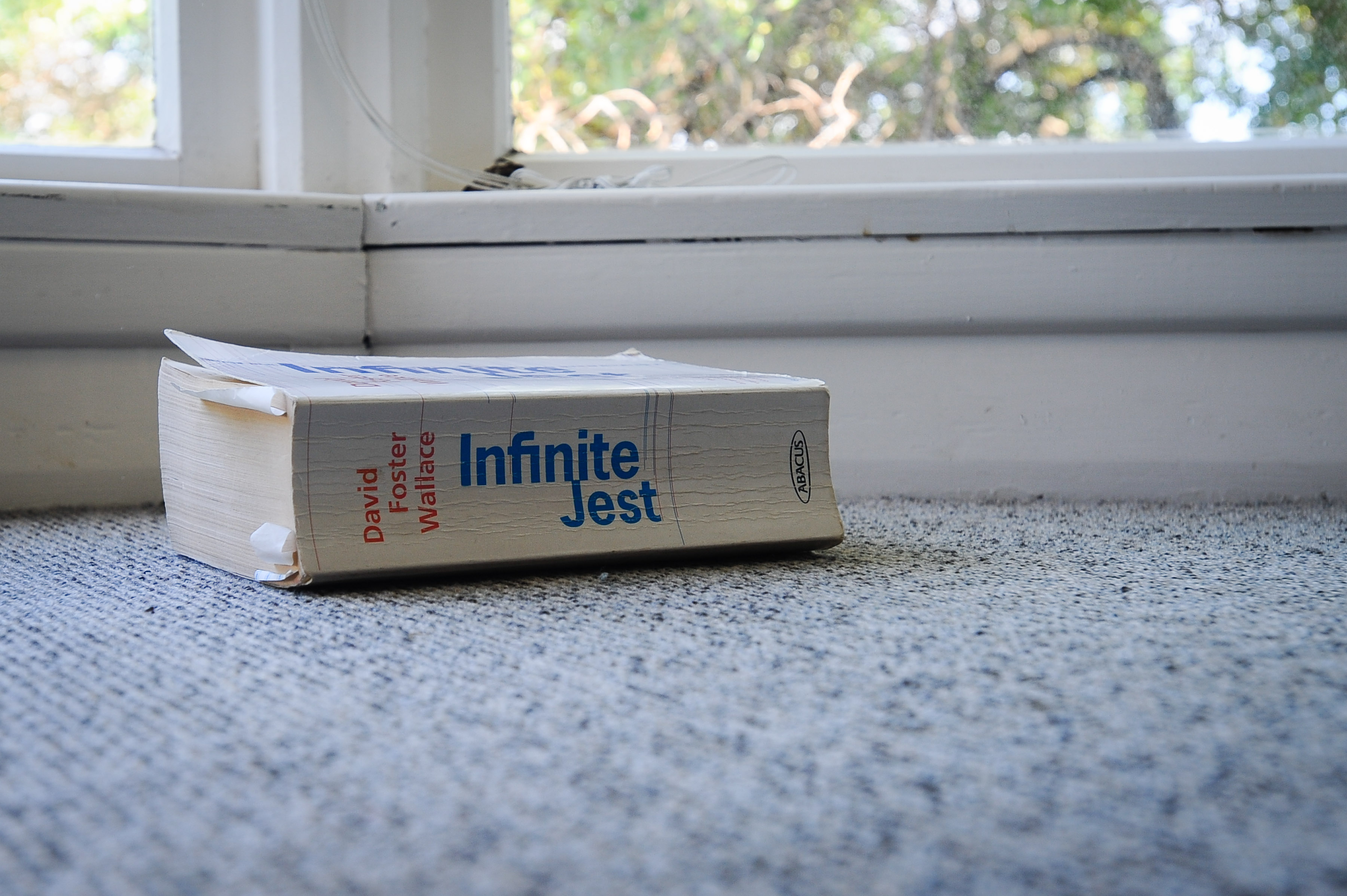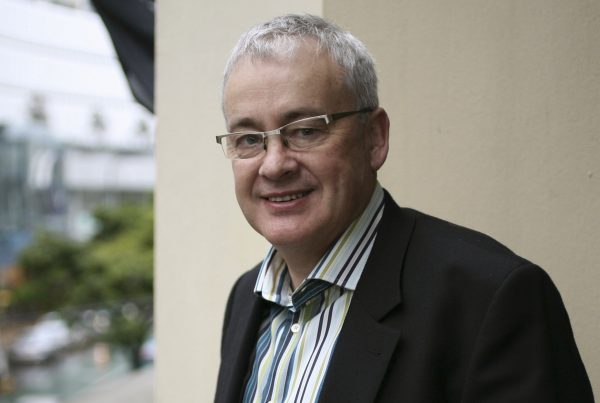
If you’re really a writer, you don’t have a choice anyway.[/quote]
[quote by=“Jeffrey Eugenides, Middlesex”]Before movements emerge, there are centres of energy…[/quote]
[quote by=“Nick Hornby, on Barbara Anderson (class of 1983)”]… and now it seems only a matter of time before Wellington replaces New York as the literary capital of the world.[/quote]
Eight Million Stories in the Naked City
In the beginning there was a little optional class for English students. It was 1975, in one of those ugly beige university tutorial rooms, and Wellington was a grey city, sombre, dominated by public servants. The students were merely sharing the creative work they were doing from the corner of their mind’s eye, so to speak. All very low key.
It wasn’t really part of their degree and they weren’t writing especially for the class, or anybody really. If your mark wasn’t very good, it just got dropped from your transcript. It was just an option. Bill Manhire, then in his 20s and recently moved to Wellington from Invercargill (and then Dunedin and then London) – “I was an aspiring poet and medievalist at the time” – got shoulder-tapped to run it, sort of by accident. Then someone – he thinks it was Jamie Belich – wondered what would happen if they all set out to write to the same exercise. So they did.
Manhire (famously retiring; now, famously, retiring) recalls, “And this astonishing work came into the room.” It was sort of an accident. Or synergy, or serendipity, a seed hitting ground that’s not just already fertile, but already tilled – that thing that’s said to constitute luck, or genius. Only you can’t say “genius” around Manhire; it’s not really a concept he’s all that fond of.
The Teacher
“I’m called a lecturer (in fact a senior lecturer) – but I don’t lecture. No one at the IIML does. There is no talking at the writers, we talk with the writers. It’s all practical. The practice of writing is what we are interested in and want to grow in the writers who study with us. That is the essential nature of the IIML – the workshop philosophy. Sitting in a circle talking – not about “writing” – but about the writing we are doing. Right now. Struggling and grappling with, skating down the smooth bits and hacking our way up the steep ones.
“If we talk and don’t write there’s no point. If we write and don’t talk about it we suspect we’ve created a work of genius. If we write and allow others to see and talk about that writing, we realise (with equal parts disappointment and excitement) that it is not genius – it is simply and thrillingly a work. In progress. With a past, a present and a future.”
Ken Duncum, Director of Scriptwriting, IIML
The Director
“We were set up to promote and foster contemporary imaginative writing. Obviously through the workshops we aim to encourage students to write at a level which eventually, hopefully, will lead to publication. But there are no sure things in art. (And I do think we’re in the business of art.)”
Damien Wilkins
The Publisher
“What a student may get from a guided workshop – from a collective – I just don’t see that being possible studying one-on-one, no matter how gifted the teacher. Because of the sense of possibilities you gain in reading many different voices, in being exposed to many different views. What you learn about editing, self-criticism, through reading your classmates’ work… You start to see what works and what doesn’t, you start to feel that. I just don’t see why any talented, ambitious young writer would not choose to do the course.”
Fergus Barrowman, Victoria University Press (VUP)
The Student
“It’s a fantastic programme with an amazing track record and close ties with a terrific publisher, taught by writers I deeply respect. What else could you hope for?
“I try not to think too much about the earthquakes.”
Doug Dillaman, class of 2014
It soon became an actual class, this Original Composition thing – ENGL 252. And it started getting kinda famous. That is, its students started getting published, and the books went out into the world, the way these bold adventurers do, and they did well, and got noticed; and so did the course. It became sought after.
There were only 12 students per class, which meant only 12 students per year. More and more people applied but the class started to seem smaller and smaller. People got rejected, and cried. People got accepted, and cried. People got accepted and threw parties, and then they moved (or they moved back) to Wellington.
“What I’ve noticed, one year into working here, is that the culture seems to work – culture in the sense of ‘this is how we do things’. That’s influenced by the history, the people, the workshop and reading programme approach, the publishing success of graduates, the relationship with VUP, the building, the city… a whole bunch of things that affect each other.
“But it’s indefinable too. You know, when a workshop is exciting and fruitful there is a particular chemistry, a quality of openness and attention that’s going on, and without wanting to make grand claims, maybe that is a good vibe that can operate on other levels. But with writing you don’t always know right away why something works. It can take some time to figure that out.”

Then people started to get really mad about it. In all three senses of the word. There were complaints that the course was turning writing into a kind of closed shop; that it was this culty thing that turned out students who all spoke in the same voice; that writing classes are – somehow – cheating. Too many people were getting published and it was turning writing into a “profession”, or writers into “professionals”, or something equally dark.
All the students were attractive young women with a highly specific kind of long hair (well, aren’t they?) – they were all spectacular babies – which said something about the course, or about writing students (or perhaps about how best to keep warm in Wellington). Anyway, writing can’t be taught, they said, except that what was being said there sotto voce was more like writing shouldn’t be taught.
“I didn’t teach [a particular] student to be brilliant and urgent – that was the alchemical product of genes, upbringing, wayward reading, etc. – but it was a marvel to see how the provision of a few technical pointers, together with the workshop environment of pushing and stroking, allowed her to do the work, put it on the page.
“Culturally, placing a value on acts of the imagination is not something it makes any sense to object to. Most of the criticism comes from fear, envy and ignorance. I’m always struck by how cartoonish the attacks on Creative Writing are… From what I know, the most enduring writing groups out of the IIML tend to contain very strong and individual voices.”
Damien Wilkins
By 1997, odd and colourful things had been happening in Wellington: it didn’t feel grey any more, or sombre. (And the coffee was amazing.) It was still a city of public servants, but it had become a creative capital. Good old ENGL 252, good old Original Composition – that Rather Unexpectedly Dashing Duckling – duly became a swan: New Zealand’s first Master of Arts in Creative Writing was established (although still part of the English Department).
“I think our MA year and the undergraduate courses are superbly structured. They start with writing exercises, which are about rules and play, and gradually move to workshopping of longer pieces. Reading is central. You’re always being asked to organise your thoughts about what you’ve read. This basic organisation of teaching and learning was evolved by Bill…
“It’s highly controlled – surprisingly so – but there’s very little direction in terms of, say, lectures about aspects of craft. The guiding from the teacher is in the form of this class structure and in the way workshop conversations are managed. It’s a sea of talk but there are always deadlines and we put quite fierce demands on outputs. We expect our students to work hard. I think the staff works hard too. Anecdotally, our level of engagement with students is a noteworthy aspect of our programme. That, again, is part of Bill’s legacy.”
Damien Wilkins
Then something else happened.
“I’ve been in the luck business all my life. I liked my odds with the institute.”
Glenn Schaeffer
In the new millennium – not so much bounding onto the page as swooping in from the sky, scattering light and greenbacks – there was suddenly this game-changing, extraordinary, swashbuckling and startling new character.
He’s like a superhero, he’s deus ex machina, he’s Daddy Starbucks, he’s an Enid Blyton millionaire (Yanks are always millionaires in Enid Blyton): he is, at any rate, wildly unlikely. Things like this just don’t happen in the real world, do they? He’s a philanthropist and a lover of contemporary writing. He’s committed to supporting writers internationally and he’s passionate about fostering emerging writers. He’s a patron, on a grand scale. (He’s a dream.)
Writing from Las Vegas on Mandalay Bay Resort letterhead, Glenn Schaeffer made such a big offer that Manhire at first thought one of his friends had nicked that Vegas resort letterhead and was pulling his leg. It was like a fairy tale – not so much you shall go to the ball, but more that what was once humble Original Composition is the ball. It has a whole dance hall all of its own, now known as Glenn Schaeffer House.
Thanks to the donation from Schaeffer – and the matching fundraising upon which the gift was conditional – little ENGL 252 has become its own department with three streams – Poetry, Prose, Scriptwriting; ten students each – and undergraduate courses in non-fiction and children’s fiction. It has visiting professors and writers-in-residence, along with workshops, scholarships, project funds and ‘Writers on Mondays’. And then there are the annual exchanges with the Iowa Writers’ Workshop, which Wilkins describes as “ground zero: the most prestigious writing school in the world… Since writers are always passing through our doors – as international master-class guests or as published graduates or as friends in the literary community – we act as a kind of hub.” A hub with an unlikely name: the International Institute of Modern Letters.
“It’s often harder than you think to shed received ideas about what a novel or short story should be, and to write from curiosity and in your own way. A good writing workshop, combined with reading intensively, can help that process. It seems to accelerate discovery and, ideally, heightens risk-taking and awareness of the effects your work has on readers.”
Emily Perkins
And the ex-students keep winning awards (big awards; bigger; then, biggest), which, like being beautiful, is not at all the point or even particularly relevant, but, also like being beautiful, is certainly eye-catching and gets you all sorts of related perks.
“And if it turns out I’m wrong, I’ll still have spent a year in a great city studying storytelling craft, challenging myself creatively, and earning a respected degree. Which is a rather wonderful worst case scenario.”
Doug Dillaman
Wellington as Gotham City
In 2012, Batman retired (graciously) from the field, swooped off to his inner-city eyrie in Gotham to write poems full time and generally try to ignore the whole icon thing and is reimagined as Colonel Sanders – after all he’s created a brand – and Robin steps up, to step in. And Robin then says, slightly plaintively, from the office with the stunning view – this is both startling, given Wilkins’ bio, and then, when you consider it for a moment, inevitable – that he has imposter syndrome. Well, they are big shoes.
How Not to Have a Philosophy
[quote by=“Bill Manhire in 2012”]We don’t have anything as grand as a philosophy.
Bill Manhire in 2012[/quote]

Read, and keep reading: you are the sum total of the voices you have read. Write, and keep writing. Take working seriously, and yourself, not. You are not a solitary genius, because you are not a) solitary – you are part of a community of writers, both the ones sitting next to you in the workshops, and the community on the page and screen all around you – or b) a genius.
Stay ignorant. Stay curious. Stay open. Stay feeling like the youngest person in the room.









